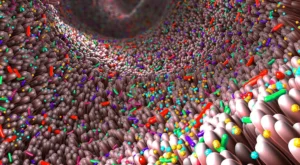By Ross Pelton, RPh, PhD, CCN
Scientific Director, Essential Formulas
Original Post Date:
September 01, 2022
Nobel Prize-winning microbiologist Joshua Lederberg coined the term ‘microbiome’ in 2001. A current search reveals that PubMed contains 17,250 publications with the word ‘microbiome’ in the title (an average of 821 publications per year). However, in just the last 12 months alone, there have been 3,857 publications in PubMed with the term ‘microbiome’ in the title.
The critical importance the gut microbiome plays in regulating human health is reflected in the amount of scientific research conducted on the microbiome. In the United States, scientific interest in the microbiome resulted in the creation of the Human Microbiome Project (HMP) in 2007. The growing interest in the microbiome and its impact on human health has resulted in the initiation of many similar microbiome projects all around the world, such as:
- Europe: MetaHIT (metagenomics of the human intestinal tract, 2008–2011) to assess the role of the microbiota in inflammatory bowel disease and obesity.
- France: MicroObes researching the relationship between the microbiome and obesity (2008–2010).
- Australia: The Australian Jumpstart Human Microbiome Project (2009)
- Canada: The Canadian Human Microbiome Initiative (2009)
- Korea: Korean Microbiome Diversity Twin Cohort Project (2010–2015)
- China: studying the human gut microbiome and infections
- Japan: The Human Metagenome Consortium
- Ireland: ELDERMET changes in the microbiome with aging (2007–2013).
- International: The International Human Microbiome Consortium
For a long time, the prevailing opinion about the colon or large intestines was that its primary function is eliminating waste material in the form of bowel movements.
Scientific research over the past several decades has revealed that the human gut microbiome, which is ‘home’ to approximately 100 trillion bacteria, is the most significant metabolic organ in the body. More recent advancement in microbiome science is the understanding that compounds called postbiotic metabolites play essential roles in regulating health throughout the body, especially the immune system.
Probiotic bacteria produce postbiotic metabolites in the colon when they ferment and digest compounds in the foods we eat. Two primary dietary compounds serve as food for your probiotic bacteria: dietary fibers and polyphenols. However, several studies have reported that 90-95% of American children and adults do not consume adequate amounts of dietary fiber and polyphenols. Consequently, many Americans have some degree of dysbiosis (microbial imbalance), intestinal irritation, and damage to the lining of the intestinal tract, which allows harmful substances to pass into systemic circulation. These problems are associated with most age-related, chronic degenerative diseases.
The discovery of the importance of postbiotic metabolites is responsible for a significant paradigm shift in our understanding of probiotic bacteria and the gut microbiome.
YES, probiotic bacteria are essential.
YES, prebiotics is essential. They are non-digestible compounds in the food we eat (dietary fibers and polyphenols), which are food for probiotic bacteria.
HOWEVER, postbiotic metabolites, critical health-regulating compounds, are the final step in this process. But remember, most people do not consume a plant-based diet, so they are not supplying their probiotic bacteria with adequate amounts of the foods they require to make postbiotic metabolites.
At Essential Formulas, we are proud to be on the leading edge of this revolution in microbiome science with our flagship product Dr. Ohhira’s Probiotics. The multi-year fermentation process created by Dr. Ohhira results in the creation of over 500 postbiotics in each dose of Dr. Ohhira’s Probiotics. Consequently, Dr. Ohhira’s Probiotics is the leading product in the world for the direct delivery of postbiotic metabolites.
Dr. Ohhira’s Probiotics is a fast-acting, multi-functional probiotic that has developed a worldwide reputation for quickly improving dysbiosis-related gastrointestinal symptoms and supporting and maintaining a healthy microbiome.supporting and maintaining a healthy microbiome.





